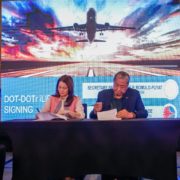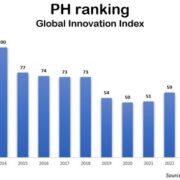CLARK, PAMPANGA— Philippine tourism and transportation officials on Tuesday convened to strengthen the tourism infrastructure convergence program to ensure that the country’s tourism industry is off to another productive year with enhanced tourism infrastructure and increased connectivity.
The conference highlight included the signing of the Memorandum of Agreement titled “Institutionalized Leveraging of Infrastructure Program for Airport Development (iLiPAD) led by Tourism Secretary Bernadette Romulo-Puyat and Transportation Secretary Arthur P. Tugade. The institutionalized convergence program primarily aims to synchronize efforts to boost airport and route development programs.

In her opening remarks, the tourism chief announced that the Tourism Infrastructure and Enterprise Zone Authority, or TIEZA, the implementing agency and infrastructure arm of the Department of Tourism (DOT), is currently working with the Department of Transportation (DOTr) on the possibility of funding several airports in the country to equip them with night-rating capabilities. “Funding amounting to Php 1 billion is set for approval by the TIEZA Board in their next board meeting. We must make sure that it’s not only more fun in the Philippines, but much safer too.”
In his remarks, DOTr Secretary Tugade expressed his full support and commitment to work with the DOT.
“I would like to thank the Department of Tourism. This gesture is very encouraging, because believe it or not, the capacity of all commercially-operating airports in the Philippines has and have to be night-rated in order that they make sense and the efficiency desired can be achieved,” stressed Secretary Tugade.
Meanwhile, Puyat added that, “Tourism and Connectivity will be closely linked in the next two decades, in the same way the Convergence Approach today enables mutually beneficial cooperation between the DOT with different agencies and the private sector. It is the sort of cooperation that will help ensure the success of one of our latest projects, the DOT’s Transforming Communities Towards Resilient, Inclusive, and Sustainable Tourism (TouRIST) Program”.

Sec. Puyat noted that the convergence program leverages on the existing convergence between DOT and the Department of Public Works and Highways (DPWH) for tourism roads, DPWH-DOTr for access roads to airports and partnerships with other agencies and the private sector. The convergence program is an implementation of Section 34 of RA9593 or the Tourism Act of 2009 and the National Tourism Development Program for 2016-2022.
The DOT Chief touted her agency’s partnership with DOTr and Civil Aviation Authority of the Philippines (CAAP) in facilitating the construction of new airports such as the Mactan-Cebu International Airport and the Bohol-Panglao International Airport.
She also cited the near completion of a new terminal at the Clark International Airport, just 30 minutes away from New Clark, Tarlac, the main site of the country’s triumphant hosting of the recent 30th Southeast Asian Games (SEAG).
In line with the Duterte Administration’s Build, Build, Build Program and as part of the efforts to decongest the Ninoy Aquino International Airport (NAIA), Sec. Puyat said in the works is the construction of a new international airport in Daraga, Albay, as well as the expansion plans for Davao, Iloilo, Kalibo, Puerto Princesa and Laguindingan international airports.
Joining Secretaries Puyat and Tugade were DOT Undersecretary Arturo Boncato, Jr., Usec. Manuel Tamayo, DOT Region 3 Director Carolina Uy, officials of TIEZA and CAAP. Representatives from the private sector include Philippine Airlines, Air Asia Philippines, Cebu Pacific, Air Swift, Air Juan, Aboitiz InfraCapital, Inc. GMR-Megawide Cebu Airport Corporation and LIPAD Consortium.
Also in attendance at the 2020 convergence conference were representatives of the Manila International Airport Authority (MIAA), Civil Aeronautics Board (CAB), International Air Transport Association (IATA), Bureau of Immigration (BI), Office of the Transportation Security (OTS), Tourism Congress of the Philippines (TCP), DOT regional directors and CAAP area managers.






